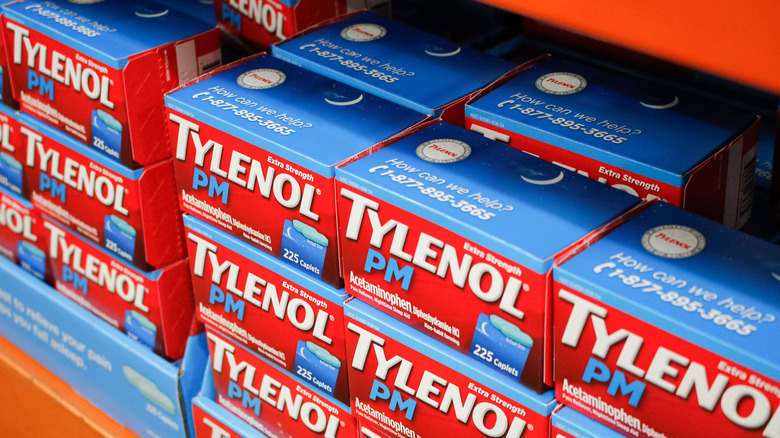Does Tylenol Cause Constipation?
Many people turn to Tylenol for relief when dealing with a pounding headache or a fever that won't go away. It's a staple in many households, commonly recommended by doctors during cold and flu season, and generally considered safe for reducing pain and fever (via Harvard Health Publishing). But what if you take Tylenol and subsequently become constipated? Could Tylenol be to blame?
Acetaminophen is the active ingredient found in Tylenol and is usually well-tolerated when used in the recommended dosages for short periods of time. However, in some cases, acetaminophen can cause side effects, including constipation. According to a 2007 study published by Neurogastroenterology & Motility, researchers found a significant association between acetaminophen intake and constipation. This self-reported survey linked chronic constipation to participants who regularly took seven or more acetaminophen tablets per week. But do all Tylenol products carry this risk? Interestingly, some may have a greater chance of constipation than others.
Tylenol products with a greater risk of constipation
Depending on the kind of relief you need, you have several varieties of Tylenol to choose from. One of the most popular options is Tylenol PM, an over-the-counter medication marketed toward those with sleep difficulties. Unfortunately, this product contains diphenhydramine in addition to acetaminophen. Diphenhydramine can also cause constipation as a side effect, and thus both combined may compound your risk (via Cleveland Clinic).
Tylenol with codeine, a prescription medication that contains acetaminophen and codeine, can also carry a greater risk of constipation. Codeine is an opioid that slows down the central nervous system, which in turn slows involuntary bodily functions like digestion (via Medical News Today). The combined effects of both ingredients can cause troublesome symptoms such as hard stools, difficulty defecating, and a persistent feeling of needing to use the bathroom.
While Tylenol can be helpful when it comes to pain management, it's worth remembering that Tylenol, like any over-the-counter medication, is still a drug with risks. Some of the best ways to ensure your safety are to check all medication labels for acetaminophen content to avoid double-dosing, take only the recommended doses, be mindful of how long you can safely take the medication for, and seek medical guidance on medication interactions if you take anything else (via Harvard Health Publishing).
How to treat constipation caused by Tylenol
When it comes to treating Tylenol-induced constipation, it really depends on which type of product you are taking and if the acetaminophen is mixed with any other ingredients. For instance, prescription painkillers often combine acetaminophen with opioids like hydrocodone, oxycodone, codeine, and synthetic opioids like tramadol (per GoodRx). Since both acetaminophen and opioids can cause constipation, you'll want to try treatments such as adding in a laxative or stool softener, eating fiber, exercising, and drinking lots of water, according to Healthgrades. If these options don't relieve your constipation, you can speak with your doctor about trying a suppository, adding a prescription medication like Movantik for combating opioid-induced constipation, or switching your acetaminophen-opioid medication for an alternative treatment.
If you experience constipation from the combination of acetaminophen and diphenhydramine in Tylenol PM, then it is recommended that you speak with your doctor or pharmacist for specific recommendations, including different medications that can relieve pain and improve sleep, recommends GoodRx. It's important to note that constipation has been found to be a side effect of long-term use of diphenhydramine. When constipation stems from acetaminophen itself, or you're generally experiencing the discomfort of constipation, then there are over-the-counter (OTC) medications such as Miralax, Metamucil, Milk of Magnesia, and glycerin suppositories that can help get your gastrointestinal (GI) tract moving again. Prebiotics, probiotics, fiber, coffee, and water are ways that you can relieve constipation through dietary means. Always consult with your healthcare provider if you have concerns.



